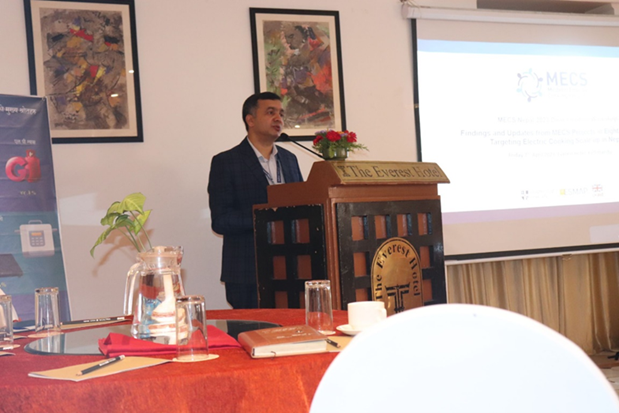
- Date
- 9th May 2023
- Categories
- Electric Cooking
By Dr Richard Sieff (Gamos Ltd., Loughborough University).
Workshop Overview
MECS Nepal 2023 Dissemination Workshop took place on Tuesday 7th April at 8.30am-1pm in Everest Hotel, Baneshwor, Kathmandu. This workshop presented the findings and updates from 18 MECS projects (8 completed/10 ongoing) in eight key areas targeting electric cooking (eCooking) scale up in Nepal. Based on the research findings, the workshop informed policymakers, investors, and other key stakeholders of the clear opportunities for scaling eCooking in Nepal. Over 70 representatives from key stakeholder groups in the Nepali clean cooking and electricity sectors attended, including Alternative Energy Promotion Centre (AEPC), Nepal Electricity Authority (NEA), major international and domestic development agencies, the private sector, academia, media, and other sectoral experts including the former Minister for Environment, Science and Technology, Er. Mr Ganesh Shah.
The eight key research areas covered by the 18 MECS projects
- Assessing the long-term impact of the Electric Cooking Outreach (ECO) pilot studies.
- In-depth exploration of the implications of households cooking entirely with electricity.
- Cooking Support on Mini-Grids (COSMO) challenge fund.
- Sparking the Cooking Supply Chain challenge fund.
- Unlocking the potential for enterprise level electric cooking in Nepal.
- A study on repair and end of life – electric cooking and domestic appliances.
- Developing non-technical policy guidance on standards for electrical cooking appliances.
- The impact of appliance subsidies and local repair services on a sustainable eCooking ecosystem in Nepal.

Workshop summary and key highlights
The MECS projects were undertaken by the following organisations: Ajummery Bikas Foundation (ABF); Doko Recyclers, Environment Protection Centre Nepal (EPC Nepal), Kathmandu Alternative Power and Energy Group (KAPEG), National Mini/Micro Hydropower Users Society Nepal (NAMHUS), Nepal Energy Foundation (NEF), People, Energy & Environment Development Association (PEEDA), Practical Action Consulting (PAC), Women Awareness Centre Nepal (WACN), and Women Network for Energy and Environment (WONEE).
The first two presentations at the workshop articulated the findings from the eight completed projects, which had highly encouraging results. In particular:
- Three Electric Cooking Outreach (ECO) follow up studies covering data spanning a two-year period showed that people from various cultural and socio-economic groups in both urban and rural locations are willing to use and pay for electric cooking on a regular basis. The convenience and time and cost saving benefits of eCooking were especially praised by participating households, while eCooking led to significant shifts away from polluting firewood. The studies also demonstrated the effectiveness of community-to-community awareness raising in terms of increasing wider eCooking adoption in the pilot study locations.
- Five projects exploring the implications of households cooking entirely with electricity demonstrated that eCooking (using a range of efficient electric cooking appliances) is already viable as a primary mode of cooking for households in urban centres.
These findings highlighted the opportunities for government and non-government institutions to be far more dynamic in promoting and scaling eCooking – critical if Nepal is to move from the current 0.5% of Nepali households cooking primarily with electricity (Population Census, 2021) and achieve the Government’s Nationally Determined Contribution (NDC) target of 25% of households using eCooking as a primary mode of cooking by 2030.


Other workshop highlights included a summary of initial findings from the ten ongoing MECS projects and keen engagement in group discussions on how to improve information sharing and coordination in the eCooking sector. MECS researchers, Samir Thapa and Richard Sieff, also presented global experiences from the MECS programme, including examples of recent MECS national policy and carbon finance initiatives facilitating scale up in FCDO priority countries.
At the workshop, strong supporting statements for MECS and eCooking were received from key government stakeholders. Alternative Energy Promotion Centre (AEPC) Assistant Director, Dr Rana Bahadur Thapa stated the MECS research and data reference points are what is needed to support the eCooking sector going forward. AEPC Acting Executive Director, Mr Nawa Raj Dhakal called for “coordination, collaboration, and partnership” to scale eCooking, emphasising a central focus of the workshop.

Workshop presentations:
Featured image: The workshop drew an audience from a range of stakeholders working in the clean cooking and electrification sectors in Nepal (image credit: S.Pandit/KAPEG, 2023).